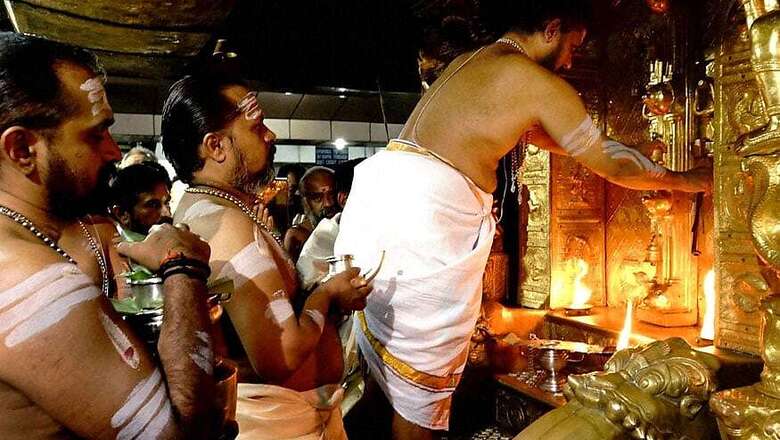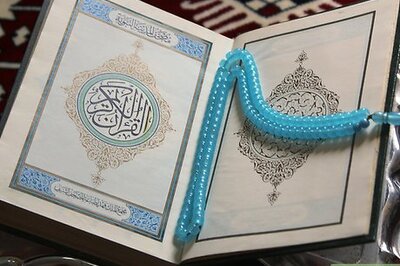Women's Exclusion From Sabarimala Based on Menstrual Age is Untouchability, Says Justice Chandrachud

views
New Delhi: Exclusion of women, based on age or menstrual status, from entering Kerala's Sabarimala temple is a form of "untouchability" which places them in a "subordinate" position, perpetuated "patriarchy" and is "derogatory to their dignity", Justice D Y Chandrachud said Friday in his verdict allowing them entry to the shrine.
Justice Chandrachud's judgment concurred with the majority verdict of Chief Justice Dipak Misra and Justices RF Nariman and A M Khanwilkar who set aside the centuries-old practice of barring entry of women of ages 10 to 50 into the temple, saying it was illegal and unconstitutional.
Justice Indu Malhotra, the lone woman judge of the five-member bench, however, dissented with the majority view.
Women, of menstruating ages, were barred from entry to places of worship, including Sabarimala, on the basis of two Travancore Devaswom Board notifications of October 1955 and November 1956, which were in 1992 upheld by the Kerala High Court, as well as Rule 3(b) of the Kerala Hindu Places of Public Worship (Authorization of Entry) Rules 1965.
Justice Chandrachud, while setting aside the two notifications and rule, said exclusion of women on "notions of impurity and pollution" associated with menstruation was a form of untouchability, which was prohibited under Article 17 of the Constitution, and an "anathema to constitutional values".
He said that Article 17 certainly applies to untouchability practices in relation to lower castes, but it will also apply to the systemic humiliation, exclusion and subjugation faced by women.
"Prejudice against women based on notions of impurity and pollution associated with menstruation is a symbol of exclusion. The social exclusion of women, based on menstrual status, is but a form of untouchability which is an anathema to constitutional values," he said.
Chandrachud further said that to "exclude women from worship by allowing the right to worship to men is to place women in a position of subordination" and "the Constitution, should not become an instrument for the perpetuation of patriarchy".
He also said that a physiological feature associated with a woman cannot provide a constitutional rationale to deny her the right to worship which is available to others.
Justice Chandrachud, in his separate concurring verdict of 165 pages, went on to add that practices which destroy liberty and make some citizens less equal than others "can simply not be countenanced".
"To treat women as children of a lesser god is to blink at the Constitution itself. To allow practices derogatory to the dignity of a woman in matters of faith and worship would permit a conscious breach of the fundamental duties of every citizen. We cannot adopt an interpretation of the Constitution which has such an effect," he said.
The Devaswom Board and others, arguing for continuing the bar on menstruating women from entering Sabarimala, had contended that it was a centuries-old practice and that the shrine was a denominational temple and therefore, entitled to set its own rules and regulations.
Rejecting the contentions, Justice Chandrachud said even the Kerala High Court had noted that women were allowed entry into the temple before coming of the notifications and for several years even after that and observed that it demonstrated that the practice of excluding women was not uniform.
On the issue of the shrine being a denominational temple, the judge said a "distinctive feature" of the pilgrimage to Sabarimala was that pilgrims of all religions participate in the pilgrimage on an equal footing and therefore, the collective cannot claim to be regarded as a "religious denomination".
He also rejected the claim that the "main reason" for exclusion of women from entry into the temple was the "arduous nature of the journey" which could not be completed by them due to physiological reasons, saying this "falls foul of the requirement that a practice claiming constitutional protection must be on strictly religious grounds".
"Of significant importance, is that such a claim is deeply rooted in a stereotypical and constitutionally flawed notion that women are the weaker sex and may not undertake tasks that are too arduous for them. This paternalistic approach is contrary to constitutional guarantee of equality and dignity to women," he said, adding that "it is inconceivable that age could found a rational basis to condition the right to worship".
Another argument forwarded to support the bar on women's entry into the temple was that those of ages 10-50 were in the procreative age.
Rejecting the contention, the judge said, "All women in the age group of 10-50 may not in any case fall in procreative age group. To exclude women is derogatory to an equal citizenship."
He also dismissed the argument that since celibacy was a requirement for all the followers, women between the ages of ten and fifty must not be allowed in Sabarimala, saying "there is an assumption here, which cannot stand constitutional scrutiny".
The assumption in such a claim is that a deviation from the celibacy and austerity observed by the followers would be caused by the presence of women, he said, adding that such a claim cannot be sustained as a constitutionally sustainable argument.
"Its effect is to impose the burden of a man's celibacy on a woman and construct her as a cause for deviation from celibacy.
"This is then employed to deny access to spaces to which women are equally entitled. To suggest that women cannot keep the 'vratham' (penance) is to stigmatize them and stereotype them as being weak and lesser human beings. A constitutional court such as this one, must refuse to recognize such claims," he said.




















Comments
0 comment